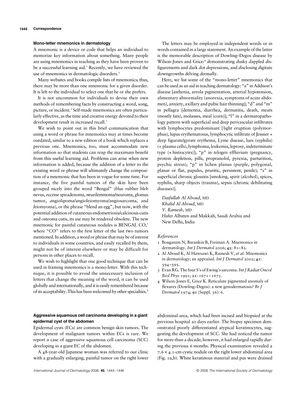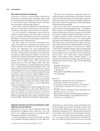Mono-Letter Mnemonics in Dermatology
December 2006
in “
International Journal of Dermatology
”

TLDR Mnemonics with one letter are useful and easy to remember for learning dermatology.
The document discusses the use of mnemonics in dermatology, highlighting their effectiveness as a learning aid but also noting the challenges they face when new information necessitates updates. The authors suggest that mono-letter mnemonics can be a useful technique, as they are less likely to become outdated with the addition of new information, can be used internationally, and are easily remembered. They provide examples of mono-letter mnemonics for various dermatological conditions, such as "a" for Addison's disease and "p" for telogen effluvium. The document also briefly mentions a case of aggressive squamous cell carcinoma developing in a giant epidermal cyst of the abdomen in a 48-year-old Japanese woman, illustrating the clinical relevance of dermatological knowledge.







